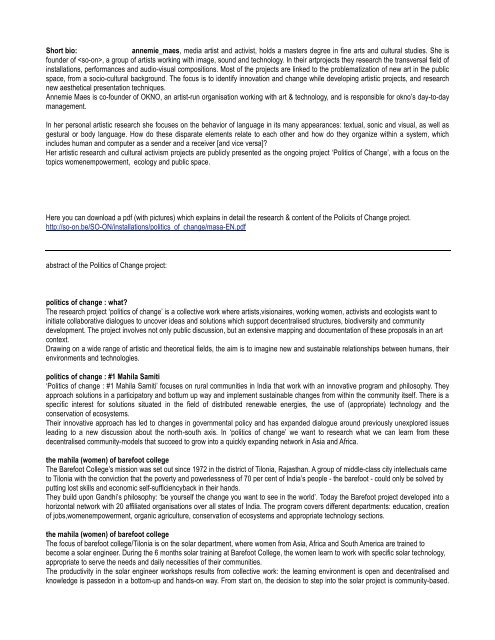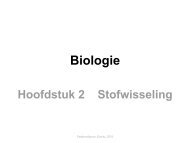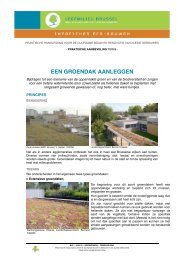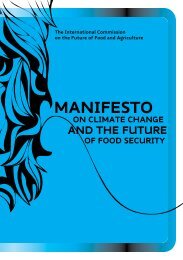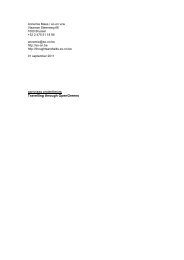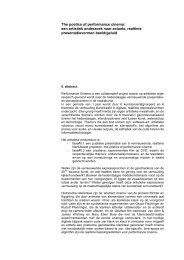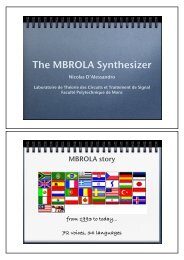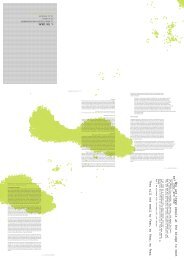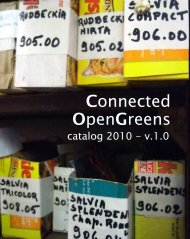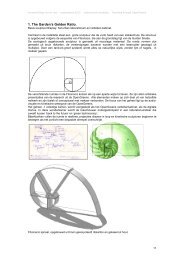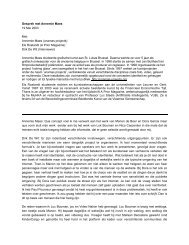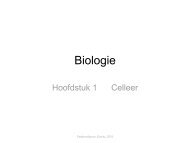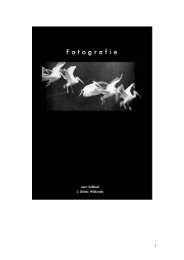Short bio: annemie_maes, media artist and activist, holds a masters ...
Short bio: annemie_maes, media artist and activist, holds a masters ...
Short bio: annemie_maes, media artist and activist, holds a masters ...
Create successful ePaper yourself
Turn your PDF publications into a flip-book with our unique Google optimized e-Paper software.
<strong>Short</strong> <strong>bio</strong>:<br />
<strong>annemie</strong>_<strong>maes</strong>, <strong>media</strong> <strong>artist</strong> <strong>and</strong> <strong>activist</strong>, <strong>holds</strong> a <strong>masters</strong> degree in fine arts <strong>and</strong> cultural studies. She is<br />
founder of , a group of <strong>artist</strong>s working with image, sound <strong>and</strong> technology. In their artprojects they research the transversal field of<br />
installations, performances <strong>and</strong> audio-visual compositions. Most of the projects are linked to the problematization of new art in the public<br />
space, from a socio-cultural background. The focus is to identify innovation <strong>and</strong> change while developing <strong>artist</strong>ic projects, <strong>and</strong> research<br />
new aesthetical presentation techniques.<br />
Annemie Maes is co-founder of OKNO, an <strong>artist</strong>-run organisation working with art & technology, <strong>and</strong> is responsible for okno’s day-to-day<br />
management.<br />
In her personal <strong>artist</strong>ic research she focuses on the behavior of language in its many appearances: textual, sonic <strong>and</strong> visual, as well as<br />
gestural or body language. How do these disparate elements relate to each other <strong>and</strong> how do they organize within a system, which<br />
includes human <strong>and</strong> computer as a sender <strong>and</strong> a receiver [<strong>and</strong> vice versa]?<br />
Her <strong>artist</strong>ic research <strong>and</strong> cultural activism projects are publicly presented as the ongoing project ‘Politics of Change’, with a focus on the<br />
topics womenempowerment, ecology <strong>and</strong> public space.<br />
Here you can download a pdf (with pictures) which explains in detail the research & content of the Policits of Change project.<br />
http://so-on.be/SO-ON/installations/politics_of_change/masa-EN.pdf<br />
abstract of the Politics of Change project:<br />
politics of change : what?<br />
The research project ‘politics of change’ is a collective work where <strong>artist</strong>s,visionaires, working women, <strong>activist</strong>s <strong>and</strong> ecologists want to<br />
initiate collaborative dialogues to uncover ideas <strong>and</strong> solutions which support decentralised structures, <strong>bio</strong>diversity <strong>and</strong> community<br />
development. The project involves not only public discussion, but an extensive mapping <strong>and</strong> documentation of these proposals in an art<br />
context.<br />
Drawing on a wide range of <strong>artist</strong>ic <strong>and</strong> theoretical fields, the aim is to imagine new <strong>and</strong> sustainable relationships between humans, their<br />
environments <strong>and</strong> technologies.<br />
politics of change : #1 Mahila Samiti<br />
‘Politics of change : #1 Mahila Samiti’ focuses on rural communities in India that work with an innovative program <strong>and</strong> philosophy. They<br />
approach solutions in a participatory <strong>and</strong> bottum up way <strong>and</strong> implement sustainable changes from within the community itself. There is a<br />
specific interest for solutions situated in the field of distributed renewable energies, the use of (appropriate) technology <strong>and</strong> the<br />
conservation of ecosystems.<br />
Their innovative approach has led to changes in governmental policy <strong>and</strong> has exp<strong>and</strong>ed dialogue around previously unexplored issues<br />
leading to a new discussion about the north-south axis. In ‘politics of change’ we want to research what we can learn from these<br />
decentralised community-models that succeed to grow into a quickly exp<strong>and</strong>ing network in Asia <strong>and</strong> Africa.<br />
the mahila (women) of barefoot college<br />
The Barefoot College’s mission was set out since 1972 in the district of Tilonia, Rajasthan. A group of middle-class city intellectuals came<br />
to Tilonia with the conviction that the poverty <strong>and</strong> powerlessness of 70 per cent of India’s people - the barefoot - could only be solved by<br />
putting lost skills <strong>and</strong> economic self-sufficiencyback in their h<strong>and</strong>s.<br />
They build upon G<strong>and</strong>hi’s philosophy: ‘be yourself the change you want to see in the world’. Today the Barefoot project developed into a<br />
horizontal network with 20 affiliated organisations over all states of India. The program covers different departments: education, creation<br />
of jobs,womenempowerment, organic agriculture, conservation of ecosystems <strong>and</strong> appropriate technology sections.<br />
the mahila (women) of barefoot college<br />
The focus of barefoot college/Tilonia is on the solar department, where women from Asia, Africa <strong>and</strong> South America are trained to<br />
become a solar engineer. During the 6 months solar training at Barefoot College, the women learn to work with specific solar technology,<br />
appropriate to serve the needs <strong>and</strong> daily necessities of their communities.<br />
The productivity in the solar engineer workshops results from collective work: the learning environment is open <strong>and</strong> decentralised <strong>and</strong><br />
knowledge is passedon in a bottom-up <strong>and</strong> h<strong>and</strong>s-on way. From start on, the decision to step into the solar project is community-based.
The village selects <strong>and</strong> delegates its future women engineers for a 6 months training, <strong>and</strong> every village family engages itself to pay its<br />
share in the remuneration of the engineers to set up <strong>and</strong> maintain the village solar system.<br />
The solar engineer project has demonstrated that providing lighting through solar energy could also be a women’s responsability for the<br />
household in the near future.<br />
Most of the solar engineers come from traditional <strong>and</strong> conservative societies <strong>and</strong> they have struggled to fight for their identity. The women<br />
engineers have been gradually accepted by the village communities <strong>and</strong> are respected for the work they do. These rural women have<br />
become symbols of a new partnership. The training of Barefoot women engineers, although first regarded with suspicion, is now gaining<br />
more popularity among the rural people. It provides an additional income <strong>and</strong> gives women a larger sense of independence <strong>and</strong><br />
responsability. They have displayed their capacity <strong>and</strong> efficiency within their community, are respected <strong>and</strong> repeatedly used as examples<br />
to propagate <strong>and</strong> elevate women’s status.<br />
politics of change : why?<br />
As <strong>artist</strong>s, filmmakers <strong>and</strong> <strong>activist</strong>s whose practice incorporates ecological thinking, we have to enrich the public debate around ethical<br />
living, environmental sustainability <strong>and</strong> eco-technology. We have to think about the kind of future in which we want to live <strong>and</strong> work. What<br />
lifestyles, what social <strong>and</strong> economic systems can we envisage beyond the usual?<br />
Is there anything that we can learn from existing social experiments to help us make our economic <strong>and</strong> political systems less fragile <strong>and</strong><br />
unstable?<br />
The case study of the Barefoot College project is a good example to start with. Their independent, distributed <strong>and</strong> DIY approach is worth<br />
the attention of a larger public. A public that is aware of the actions <strong>and</strong> solutions needed to build on the construction of a more balanced<br />
society, contributing sustainable changes to social <strong>and</strong> ecological structures, a public with a focus on the sharing of knowledge.<br />
politics of change : how?<br />
so-on collective positions itself as a disturbing factor, the noise; one that confronts art society with other approaches, other visions, other<br />
thoughts-<strong>and</strong>-talks.<br />
The focus lies on creative interventions that aim to be transformational, on processes that enable individuals <strong>and</strong> communities to live in a<br />
more sustainable way, or suggest alternative possibilities for sustainability. Collaborative creation, open source technology, <strong>and</strong><br />
questioning borders could become tools to transform our consumer-society into more participatory cultures.<br />
What can the electronic arts community do to propagate these tools <strong>and</strong> methods into everyday life? If we look at the problems of<br />
distribution of goods, people <strong>and</strong> information, can we learn from the robustness of distributed collaboration <strong>and</strong> non- Western<br />
perspectives to enable social change?<br />
Cultural diversity as a resource for sustainable innovative ideas, alternative models <strong>and</strong> experimental learning scenarios can create new<br />
hybrids of practice <strong>and</strong> research. We have to restructure for new learning cultures, new models of work <strong>and</strong> knowledge spaces; the role<br />
<strong>and</strong> inclusion of <strong>artist</strong>s <strong>and</strong> extra-institutional models of organization <strong>and</strong> education can make emerge sustainable innovative networks.<br />
If we consider knowledge production as a 2-way process, we also have to consider how a research process can become a project of<br />
partnership with full advantages for all the partners involved. These dialogues must be understood as a process at the borders of cultural<br />
diversity, where intersubjective exchanges create new forms of action that collaboratively build upon a shared knowledge.<br />
Mahila (women) – 16:9 high def. movie – 26 minutes, color, sound - english spoken
** INSTALLATION SETUP **<br />
Ghent (B) – Vooruit festival ‘the Game is Up!’ How to save the world in 10 days?<br />
Kortrijk (B) – Happy New Festival (festival van Vla<strong>and</strong>eren) – Klinkende Stad, Politics of Change - set up in old greenhouse.
Helsinki (Fi) – Pixelache festival – Muu Gallery ‘ Signals from the South’ – Politics of Change
Antwerp (B) - Gynaika, In Between gallery – Politics of Change<br />
detaill of custom made computer
Politics of Change Magazine/Newspaper – part of the installation as a take away publication (I can bring them, I still have a lot of copies)<br />
Also downloadable on the internet: http://thoughts<strong>and</strong>talks.so-on.be/2009/03/08/poc-the-newspaper/<br />
Can be part of as well the installation as the online setup.
** ONLINE SETUP **<br />
The online setup is part of the pad.ma archive (public accessible digital <strong>media</strong> archive), a text-annotated video-database developed by<br />
Jan Gerber, Seb Luettger <strong>and</strong> Sanjay Banghar. The content of pad.ma covers mainly Indian <strong>and</strong> South Asian topics.<br />
(For the TIK – Time Inventors’ Kabinet project, okno will collaborate with the padma developers <strong>and</strong> setup another version of padma:<br />
Padma.okno.be, which will serve as a documentation repository for the TIK project.)


